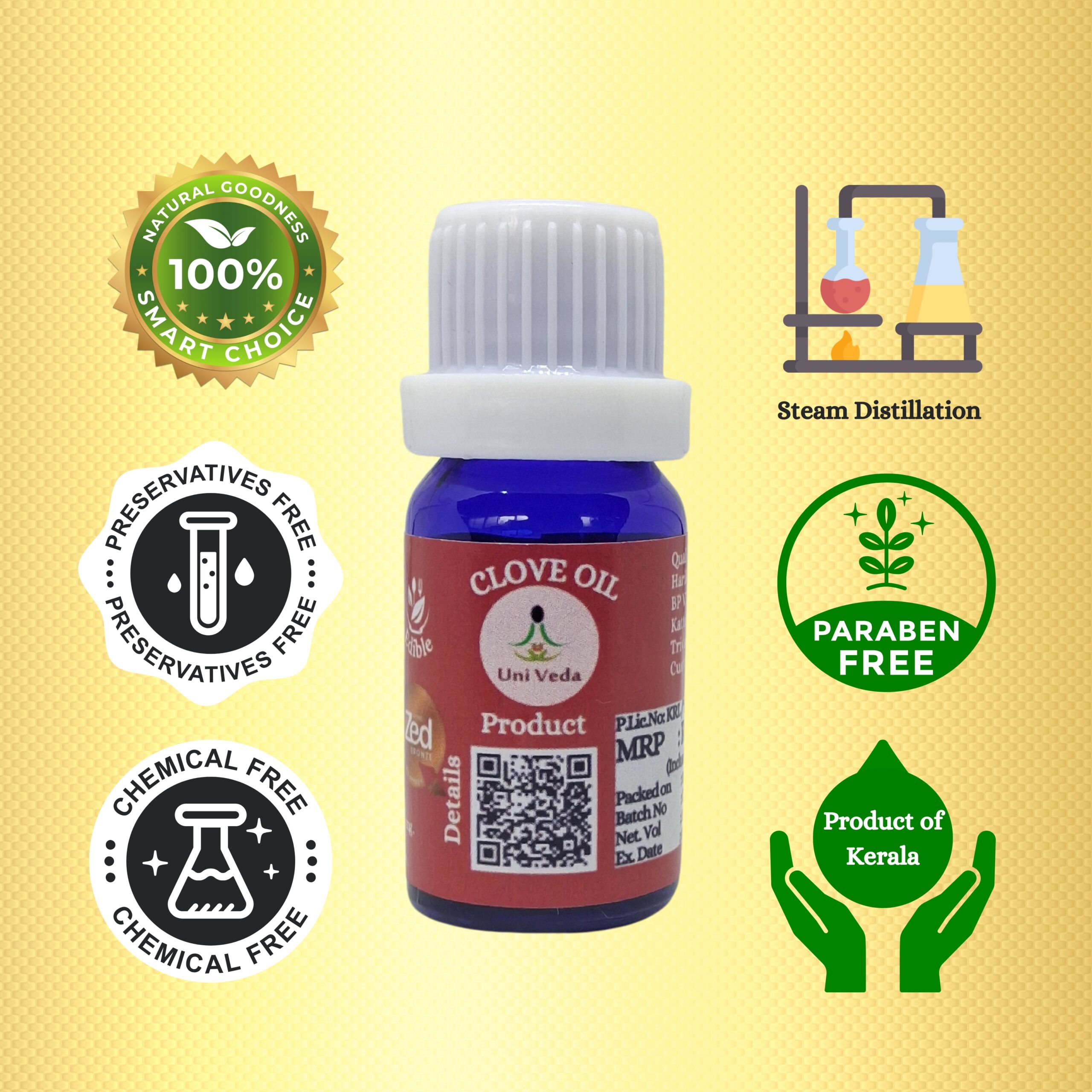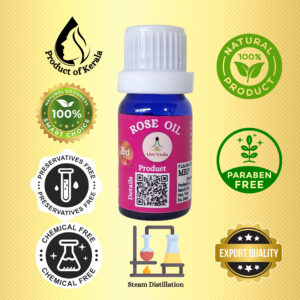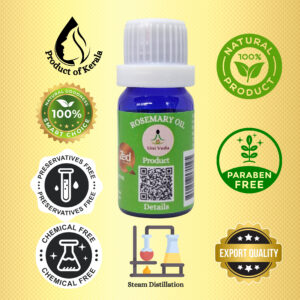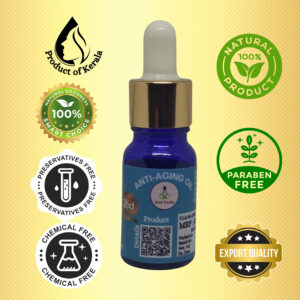OVERVIEW
Unveiling the Power of Clove Essential Oil:
In the world of natural remedies and holistic wellness, clove essential oil stands out as a potent elixir with a rich history and an array of health benefits. Extracted from the aromatic flower buds of the Syzygium aromaticum tree, clove oil is renowned for its warm, spicy fragrance and powerful therapeutic properties. This versatile oil has been cherished for centuries, tracing back to ancient civilizations that recognized its value in medicine, culinary arts, and spiritual practices.
The Origin and Extraction of Clove Essential Oil
Native to the Maluku Islands in Indonesia, commonly known as the Spice Islands, the clove tree is an evergreen that thrives in tropical climates. The essential oil is primarily extracted through steam distillation of the dried flower buds, capturing the essence of the plant’s active compounds.
A Historical Perspective
Clove’s use dates back over 2,000 years:
- Traditional Medicine: In Ayurveda and Traditional Chinese Medicine, clove was utilized to treat digestive ailments, respiratory conditions, and as an analgesic for pain relief.
- Ancient Rome and Egypt: Clove was highly prized, often traded as a valuable commodity. Egyptians used it in perfumes and for mummification due to its preservative qualities.
- Medieval Europe: Clove was a key ingredient in remedies during the plague, believed to protect against infection.
BENEFITS
Therapeutic Benefits of Clove Essential Oil
- Potent Antimicrobial PropertiesClove oil exhibits strong antibacterial, antiviral, and antifungal activities.
- Oral Health: It’s a common ingredient in mouthwashes and toothpaste. Clove oil combats oral pathogens that cause cavities, bad breath, and gum disease.
- Skin Infections: Effective against fungi like Candida albicans, it can help treat athlete’s foot and other fungal infections.
- Natural Pain Reliever
- Dental Pain: Eugenol acts as a natural anesthetic. Applying diluted clove oil can alleviate toothaches and gum discomfort.
- Muscle and Joint Relief: Its anti-inflammatory properties make it beneficial for soothing sore muscles and arthritic joints.
- Digestive Aid
- Alleviates Nausea and Indigestion: Clove oil stimulates the secretion of digestive enzymes, reducing gas, bloating, and promoting gut health.
- Anti-parasitic Effects: It can help eliminate intestinal parasites when used appropriately.
- Respiratory Support
- Clears Congestion: Inhaling clove oil vapors can relieve symptoms of colds, bronchitis, and sinusitis.
- Antiseptic Qualities: Helps in disinfecting the air when diffused, reducing airborne pathogens.
- Immune System Booster
- Antioxidant Powerhouse: Clove oil has one of the highest antioxidant ratings, combating oxidative stress and supporting overall immune function.
- Emotional Well-being
- Stress Reduction: The warm aroma of clove oil can enhance mental clarity, reduce fatigue, and uplift moods.
Incorporating Clove Essential Oil Into Your Routine
Aromatherapy Applications:
- Diffusion: Add 3-5 drops to an essential oil diffuser to purify the air and promote a sense of well-being.
- Inhalation: For respiratory relief, add a few drops to a bowl of hot water, cover your head with a towel, and inhale the steam deeply.
Topical Uses:
- Massage Oil: Dilute 2-3 drops of clove oil with a tablespoon of carrier oil (like coconut or almond oil) and massage onto sore muscles or joints.
- Dental Care: Mix one drop of clove oil with a teaspoon of carrier oil. Apply gently to the affected tooth or gums using a cotton swab.
Natural Cleaning Solutions:
- Disinfectant Spray: Combine clove oil with water, vinegar, and other essential oils like lemon or tea tree to create a natural household cleaner.
Skincare Remedies:
- Acne Treatment: Due to its antimicrobial properties, a highly diluted solution can be applied to acne-prone areas to reduce blemishes.
Safety Guidelines and Precautions
While clove essential oil offers numerous benefits, it’s important to use it responsibly:
- Dilution is Key: Always dilute clove oil with a suitable carrier oil before topical application to prevent skin irritation.
- Patch Test: Perform a patch test on a small skin area to check for allergic reactions.
- Internal Use: Only ingest clove oil under the supervision of a qualified healthcare professional.
- Pregnancy and Medical Conditions: Consult with a healthcare provider if you are pregnant, nursing, or have underlying medical conditions before using clove oil.
- Eye and Mucous Membrane Contact: Avoid contact with eyes and sensitive mucous membranes.
Exploring Beyond the Basics
Understanding the depth of clove essential oil’s applications can enrich your experience:
- Combining Oils for Enhanced Benefits:
- For Relaxation: Blend clove oil with lavender or chamomile to create a soothing atmosphere.
- Immune Support Blend: Mix with eucalyptus, rosemary, and cinnamon oils for a powerful immune-boosting diffuser blend.
- Culinary Uses:
- Flavor Enhancer: In very small amounts, food-grade clove oil can add flavor to recipes. Always ensure the oil is safe for consumption and use sparingly.
INGREDIENTS
Key Components:
Ingredient Benefit Snapshot for Clove Oil
Clove oil is a powerful essential oil derived from clove buds, well known for its antimicrobial, analgesic, and antioxidant properties. Below is a structured snapshot highlighting its key components and benefits.
| Component |
Key Wellness Benefit |
| Eugenol |
Strong antimicrobial agent, relieves pain, fights infections |
| Beta-Caryophyllene |
Anti-inflammatory compound, supports skin healing |
| Acetyl Eugenol |
Enhances wound healing, provides calming effects |
| Flavonoids |
Antioxidant protection, fights free radicals, promotes skin health |
| Tannins |
Aids digestion, supports oral health, helps tighten skin |
| Alkaloids |
Boosts immunity, offers antibacterial and antifungal effects |
Core Benefits of Clove Oil
✅ Relieves Pain & Inflammation – Eugenol acts as a natural analgesic, commonly used for toothaches, sore muscles, and headaches. ✅ Supports Oral Health – Its antibacterial properties help fight cavities, gum infections, and bad breath. ✅ Boosts Skin Health – Clove oil aids in acne treatment, wound healing, and skin nourishment. ✅ Enhances Immunity – Flavonoids and alkaloids provide strong antimicrobial and antioxidant protection. ✅ Aids Digestion – Helps relieve indigestion, bloating, and nausea naturally.
GUIDE
How to Use Clove Essential Oil
Clove oil is a versatile essential oil with powerful antimicrobial, analgesic, and antioxidant properties. It can be used for oral care, skincare, pain relief, immunity support, and even household purposes. Below are some effective ways to incorporate clove oil into daily use.
1. For Oral Health & Toothache Relief
- Mouthwash: Add 2–3 drops of clove oil to a glass of warm water and use it as a natural antibacterial rinse.
- Toothache Relief: Apply a drop of clove oil to a cotton swab and place it directly on the affected tooth for instant relief.
2. For Skin & Acne Care
- Acne Treatment: Mix 1 drop of clove oil with carrier oil (coconut or jojoba oil) and apply to acne-prone areas for antibacterial action.
- Wound Healing: Dilute 2–3 drops of clove oil with aloe vera gel and gently apply to cuts or minor wounds.
3. For Pain Relief & Muscle Relaxation
- Massage Oil: Combine 4–5 drops of clove oil with a carrier oil (such as olive or almond oil) and massage into sore muscles.
- Joint Pain Relief: Mix a few drops with warm sesame oil and rub it onto inflamed joints for soothing relief.
4. For Digestion & Stomach Comfort
- Bloating & Indigestion: Add 1 drop of food-grade clove oil to warm water or herbal tea for digestive support.
- Nausea Relief: Mix 2 drops of clove oil with honey and consume for a calming effect on the stomach.
5. For Respiratory Health
- Steam Inhalation: Add 3–4 drops to hot water and inhale the steam to clear congestion and soothe respiratory discomfort.
- Chest Rub: Blend a few drops with eucalyptus oil and coconut oil, then massage onto the chest for decongestant benefits.
6. For Hair Care & Scalp Health
- Scalp Treatment: Mix 2–3 drops of clove oil with coconut oil and massage into the scalp to reduce dandruff and improve circulation.
- Hair Growth: Add a few drops of clove oil to your shampoo for added nourishment and scalp stimulation.
7. For Household Uses
- Natural Insect Repellent: Mix clove oil with water and spray around entry points to repel ants and mosquitoes.
- Air Freshener: Add 5 drops to a diffuser to purify indoor air and eliminate odors.






Reviews
There are no reviews yet.